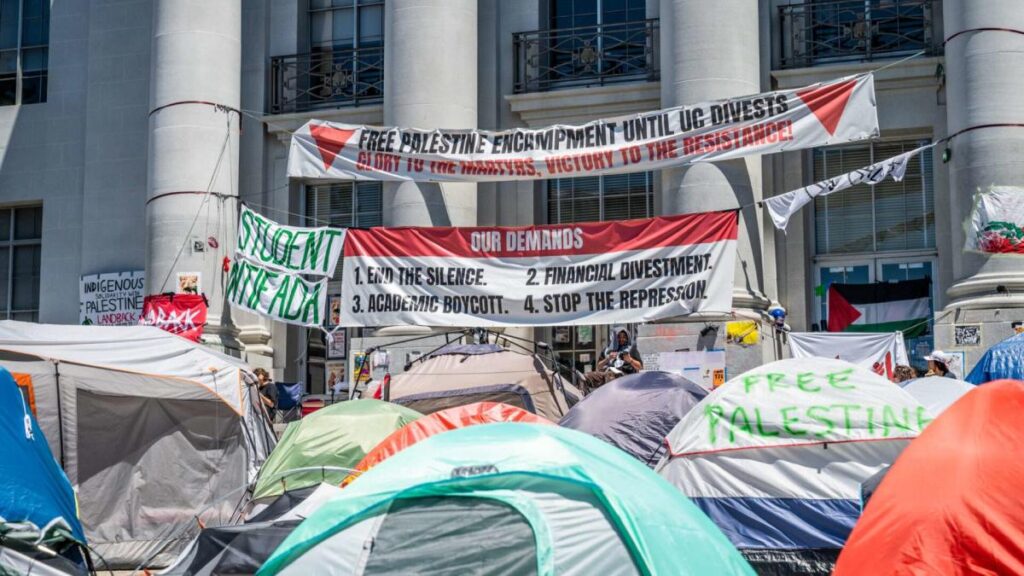As the academic year begins, campuses across the country are bracing for more protests over the conflict between Israel and Hamas. As students return to campus, the underlying issues that fueled these demonstrations—misunderstandings and misapplications of free speech—remain unresolved. These protests have exposed a pressing challenge for universities: upholding the principles of free speech in the midst of modern political activism.
While many protests last semester were peaceful, others disrupted campus activities, led to skirmishes and vandalism, and made some students feel unsafe on campus. actions of some students, linked to the reactions by some administrators, highlight a disturbing lack of understanding of free speech principles. Maintaining a campus environment that encourages the challenge of ideas, allows for dissent, and enables scientific discovery requires an unwavering commitment to free speech principles from administrators and students.
The most recent publication from the Sheila and Robert Challey Institute for Global Innovation and Growth questionnaire of students across the country offers important insights into the state of free speech on campus. An encouraging 89 percent of respondents say students have the right to participate in peaceful protests related to the war between Israel and Hamas. However, many students confuse free speech with illiberal actions that undermine it. About 40 percent of students support occupying buildings or staging “die-ins” to prevent normal campus activities from occurring, 27 percent believe that students have the right to disrupt class to protest, and 20 percent believe it is okay to silence a campus speaker who addresses the war between Israel and Hamas. While these actions can be seen as forms of protest, they hinder the free exchange of ideas and limit the ability of others to express their views.
This misunderstanding is most pronounced among students who identify as politically liberal, who are most likely to claim to support freedom of speech (93 percent of respondents do) in the context of the war between Israel and Hamas. However, politically liberal students also show the highest acceptance of actions against freedom of speech. Of these students, 55 percent say it is okay to disrupt campus by occupying buildings, 37 percent say it is okay to disrupt class with protests, 26 percent say it is okay to silence a speaker, and 18 percent say it is okay to deny a speaker access to an auditorium where a speech about Israel and Hamas is scheduled.
Not only are many students confused about what constitutes free speech, they also appear to be hypocritical in supporting free speech on some topics but not others. The apparent enthusiasm for what they consider free speech in the context of the war between Israel and Hamas contrasts with the belief held by 62 percent of all students (and 74 percent of liberal-leaning students) that professors should be reported for making controversial statements about affirmative action, police shootings, sex and gender, guns, and vaccines. Worse, 56 percent of all students and 63 percent of liberal-leaning students support reporting other students for saying something they find offensive.
Students’ confusion about the principles of freedom of expression and their lack of tolerance for different points of view pose a major problem. challenge for universities. But it remains crucial for universities to stand firm and defend the rights of students to express their opinions, no matter how unpleasant those opinions may be to an individual. They must also teach students the limits of free speech: Violence, disrupting campus activities, shouting down speakers one disagrees with, and intimidating or harassing others are not free speech. This commitment to both freedom and responsibility can provide the public with a sense of reassurance and support.
Recently, a number of universities have Chicago Declaration and the Commission Calves Report on the University’s Role in Political and Social Action – guiding principles produced by the University of Chicago intended to demonstrate a commitment to freedom of expression and institutional neutrality. Harvard University’s recent announcement is a significant development. The university stated that neither the school nor its leaders would issue official statements on public matters that did not directly impact its core function. These are important signals of a commitment to free speech on campus, and their recent adoption suggests an awakening of problems of intolerance on campus.
Universities play a crucial role in cultivating new ideas and fostering breakthrough discoveries. To maintain their position as bastions of innovation, it is essential that they not only embrace the principles of free speech but also actively advocate for them. By doing so, they can create a healthy environment in which free speech and rigorous debate flourish, and prepare students to participate in and contribute to a diverse and pluralistic society.
The post The hypocrisy of campus protest exposes the need for education for students about free speech first appeared on Reden.com.

